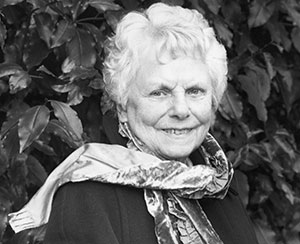Vera Farge is 86 and has lived in the village of East Coker, Somerset, for 45 years. Vera told her story to Joan Taylor:
‘I was born in Liverpool in 1920. At fourteen I left school and went to work in the local Co-op office for six years. When World War Two started, I volunteered as a nurse and eventually worked at the Alderhay Children’s Hospital, in Liverpool. During the three years I worked there, Alderhay became a military hospital. Our patients included service men, who had suffered severe frost bite in the Nordic action.
During the 1940 blitz, our family home was bombed – we just made it to the shelter. When we came out, the sewing machine I had just been using was in our neighbour’s garden. We had to live in the shelter for three weeks. A year later father’s jewellery business was bombed – people around us were losing everything. Then came the end of my seven-year romance, I was 21 and at a low ebb, I decided to join the Women’s Royal Navel Service (Wrens).
After training in communications at Mill Hill in London I was posted to Somerset. It was 1941; we lived in half a dozen Nissen huts, near a small military airfield at Henstridge. We were there for over three years. There were no inside toilets or running water; we cooked our meals on a strange little stove called a Coke Bogey.
I married Doug in June 1945, the year I was demobbed; he was an airfield runway controller. We’d met over the radio airways, while we were both on duty; our first date was to the Odeon cinema in Yeovil. I was really nervous but excited. It was a blind date – until then we had only talked on the radio.
Doug went on a special assignment with Air Traffic Control to the Berlin Airlift in 1948. Doug landed relief aircraft every two minutes, with just the aid of radar screens.
Over the next years we moved from post to post. Although I’d left the Wrens, Doug remained in the Fleet Air Arm. We’d taken lodgings in Oxfordshire and by that time our son, Michael was three years old. The conditions were terrible; we had to make do with a chemical loo, and cook Christmas dinner on a one ring oil burner, and our pudding on a little Primus stove, it was certainly a challenge. At that time I was also pregnant with our daughter, Lyn.
As a Forces family we continued to move around. We lived in Scotland, Oxfordshire, Berkshire and Portsmouth. We had two postings abroad: Malta and Singapore. It was the 1962 posting which returned us to Somerset. Doug worked as the Senior Air Traffic Controller at HMS Heron, Yeovilton. This had the most lasting impact on our family which had now grown to three. It was here that we bought our first home and forty-five years later I am still happily settled in the same house. It was hard for the family when Doug died but we had celebrated our 50th wedding anniversary.
My two daughters, Lynn and Margaret live nearby, and my son, Michael lives in the New Forest area. I have six grandchildren, and two great grandchildren. Taking an interest in what the younger generation are doing helps to keep me going.
I’m still a member of the Wrens Association and have recently been awarded my veterans badge. We meet in Yeovil once a month and this with my other interests of Westland’s Retirement Association, reading, knitting and cooking keep me active.
During my school days I had a wonderful botany teacher, she’d bring back flowers from her holidays in the Scilly Isles. Her enthusiasm sparked off my love of wild flowers. This still inspires me today, to either find expression in the garden or the motivation for walks in the countryside.
I think the secret to good health is lots of laughter and not taking life too seriously. It’s also important to eat well, and enjoy new opportunities as and when they present themselves. At 85, I still enjoy the challenge of new adventures and plan to be off travelling to Germany and Ireland this year.’








